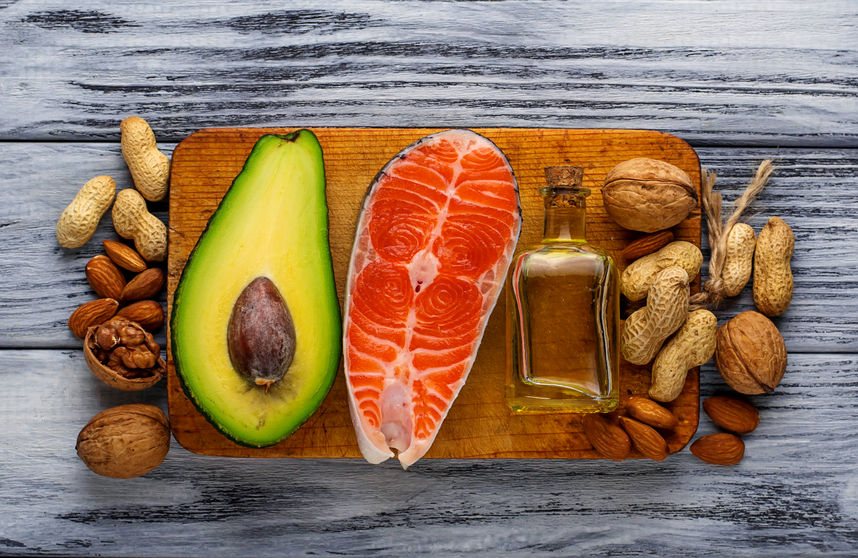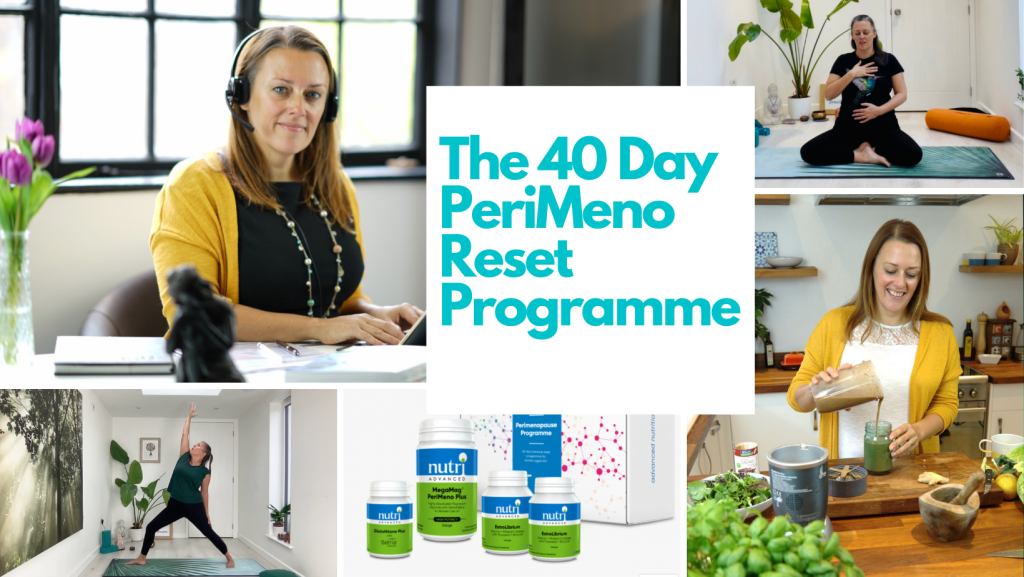
Is it possible to lose weight in the menopause? It’s a question I’m asked all the time in my clinic, with so many women struggling to maintain a healthy weight as their hormones shift. The diet and exercise regime they’ve followed for most of their adult life doesn’t seem to work anymore. Despite eating the same food and doing the same level of exercise, they find they’re putting on weight for no apparent reason, especially around the tummy. Some women tell me they used to be able to get weight off easily after they’d been on holiday or during Christmas… but now that doesn’t seem to work anymore.
So why does it seem to be harder to lose weight in menopause? Is it that our metabolism shifts? Or is something else going on? In this article, I’m going to explore the shift in hormones around the menopause and why this may affect your ability to maintain a healthy weight…. and what you can do about it!
Why can’t I lose weight in menopause?
So let’s start by first answering that question… is it possible to lose weight in menopause? Yes it absolutely is, but as your hormones shift and other things change in your body as a result, you need to adapt with this and make tweaks to how you eat and how you move.
Before we can explore the changes you need to make, I want you to understand what is actually going on in your body as you move into the menopause. Firstly, your ovaries start to reduce your production of the sex hormones oestrogen and progesterone, which is why your menstrual cycles may start to shorten or lengthen, until eventually your periods stop. So whilst the ovaries don’t produce as much oestrogen as they once did, your body compensates by producing oestrogen from elsewhere – firstly from your adrenal glands and also from your fat cells, in the form of oestrone. So that’s why you may start to lay down a bit more fat around your middle, because these fat cells help to produce a little oestrogen.
Now this isn’t actually a bad thing, because oestrogen can help to preserve your bone density, meaning you are less at risk from developing osteoporosis. This degenerative bone condition causes your bones to be less strong as they were before, putting you at risk of fracture. Oestrogen helps to keep bones strong, which is why the risk of osteoporosis increases after the menopause. It also helps to support other functions in our body, including our brain and may even be implicated in our risk of cardiovascular issues.
So whilst a little bit of fat can help to protect your bones and general health, by releasing some oestrogen, it’s important not to let this get out of control. For some women, it seems that no matter what they do, they can’t get this extra fat accumulation to slow down. They start to feel out of control with their weight. And as more excess weight is held around the tummy, this can drive sugar and carb cravings, affect how your body processes sugar and even increase your appetite even more.
So is it possible to lose weight in the menopause?
Yes you absolutely can, but you may need to make some shifts in how you eat and how you exercise. In your 20s, 30s and early 40s you may have done more cardiovascular exercise and been able to eat a higher level of carbs.
Increase protein, reduce carbs
But as your metabolism shifts and your body naturally wants to lay a little more fat around the tummy, you may need to reduce your intake of carbs, especially the refined white carbs, and shift more to a “slow carb”, higher protein way of eating.
Swap cardio for weights
It may also help to swap some cardio for weight training, or resistance type exercise like yoga. These can help to boost your basal metabolic rate (how many calories you burn when going about your daily routine) and to support your insulin sensitivity (another important strategy for fat burning at this time).
Weight training is also great in the menopause because it can help to stabilise joints and muscles.

Are you overtraining? Don’t overdo the exercise
Doing high intensity HIT and cardio training may also create another issue in the menopause – adding too much stress to your adrenal glands.
It’s important that your exercise schedule doesn’t put unnecessary pressure on your adrenal output and how much cortisol you release. When we do intense, high-impact exercise, we release more cortisol. Add this to a very busy lifestyle, with ongoing stress and overwhelm, and your adrenals are under a lot of pressure! If we enter the menopause with already tired and overworked adrenal glands, this can mean you experience more difficulty creating the hormones your body needs to be in balance.
Find a balance between high and low intensity exercise
I often find that as women reach menopause, this is the moment in their lives when they have more free time to start doing more exercise. They might feel a need to push themselves physically and long for a challenge to support their feelings of physical strength.
I see many women training for events like a marathon at this time. This is great in so many ways, especially if you’re outdoors in nature, getting fresh air and working your heart. However, it’s important to strike a balance… if you’re doing intense exercise, also focus on some stress relieving activity such as walking, yoga, meditation and just being still. And also realise, this more intense form of cardio might not be the best thing for you to lose weight.
If you’re extremely stressed at work or in your home life, is this the time to be putting huge strain on your adrenal output by adding in an intense exercise schedule? This doesn’t mean you shouldn’t do intense exercise or go for a big event you’ve always wanted to do. But you do need to reflect on whether your body is in a good place to manage this shift – is there a middle ground you could start with and see how your body reacts?

So what do I need to do to lose weight in the menopause?
Here are my top 5 tips you can work on to help you balance your hormones and adapt your diet and exercise regime as you move into menopause:
- Moderate your intake of carbs: what your body could process and use up in your 20s and 30s, you might not be able to use now without putting on weight. Aim to have 1 meal per day without starchy carbs. Also make sure you have a good handful of protein at all meals (meat, eggs, fish, cottage cheese, beans, pulses, tofu) combined with half a plate full of non-starchy veg or salad. When you do eat carbs, focus on slow carbs – no more than a handful per meal of sweet potato, oats, brown rice, buckwheat, wholewheat pasta or rye bread.
- Make sure you manage your stress: as well as your exercise schedule, make time each day to do some deep breathing, stretching, yoga or mindfulness to help moderate the cortisol response. We can all manage 5 to 10 minutes per day.
- Move, move move! If you’re not much of an exerciser and have become increasingly sedentary, make sure you’re moving on a daily basis. Avoid sitting for hours and hours at a time. Get up once an hour, work at a sit-stand desk, go for a walk at lunchtime or after supper. Aim to get 10,000 steps per day.
- Build in some calming exercise that increases your muscle strength. Yoga and Pilates are fantastic for your core strength and supporting your metabolism, as well as moderating the cortisol response. Also you can do some weight training – get some advice from a local PT or your gym if you’ve never done it before.
- Increase your intake of healthy fats: you’ll need these to support healthy cholesterol balance, as well as getting your cells to listen to all your hormone messengers. Include 2 to 3 portions daily of healthy fats like avocado, nuts, seeds (unroasted and unsalted), oily fish and olive oil.
One final tip… I often recommend that women who find their metabolism is a bit sluggish to try some intermittent fasting.
This is where you restrict your eating window to 11 to 12 hours per day. So if you eat breakfast at 7am, make sure your eating is done by 7pm… and that means no late night snacking, hot chocolates or extra wine.
Join my Next 40 Day PeriMeno Reset Programme here.
If you want to work on boosting your metabolism in the menopause and managing the hormonal swings that you may be experiencing at this time, I’m really excited to announce I have new dates coming soon for my 40 Day Peri Meno Reset Programme. This 40 Day, group online programme combines nutrition, bespoke supplements, yoga, breath work and lifestyle tweaks to help you achieve better hormone harmony. Find out more here.
